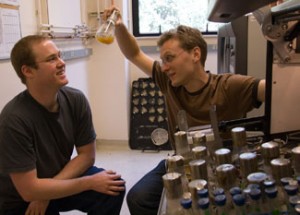Several chemists at the University of California, Berkeley have engineered bacteria for biofuels. More specifically, they have created bacteria that will churn out a gasoline-like biofuel at about 10 times the rate of competing microbes. The researchers believe this breakthrough could soon provide “green” gas. The research was published in the journal Nature Chemical Biology and authored by Assistant Professor of Chemistry at UC Berkeley Michelle C.Y. Chang along with graduate student Brooks B. Bond-Watts and recent grad Robert J. Bellerose.
The research was based on the bacteria Clostridium, where some of the species produce n-butanol, a drop-in fuel many companies are currently pursuing as a replacement for gas and diesel. Many researchers have genetically altered the bacteria to boost its ability to produce n-butanol while others have taken other routes such as plucking enzymes from the bacteria and inserted them into other microbes including E. coli. The results have only provided limited n-butanol production.
Chang and her colleagues emulated the same enzyme pathway into E. coli, but replaced two of the five enzymes with look-alikes from other organisms. This avoided one of the problems other researchers have had: n-butanol being converted back into its chemical precursors by the same enzymes that produce it.
The result was a new genetically altered E. coli strain that produced nearly five grams of n-buranol per liter, about the same as the native Clostridium and one-third the production of the best genetically altered Clostridium, but about 10 times better than current industrial microbe systems.
“We are in a host that is easier to work with, and we have a chance to make it even better,” Chang said. “We are reaching yields where, if we could make two to three times more, we could probably start to think about designing an industrial process around it. We were excited to break through the multi-gram barrier, which was challenging.”
According to an article from UC Berkeley, Chang is optimistic that by improving enzyme activity at a few other bottlenecks in the n-butanol synthesis pathway, in addition to optimizing the host microbe for production of n-butanol, she can boost production two to three times, enough to justify considering scaling up to an industrial process.


